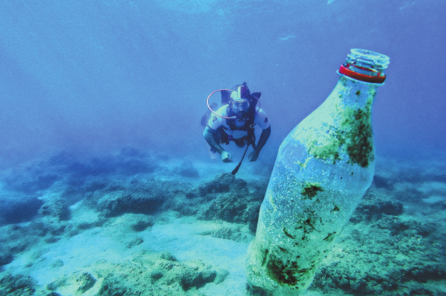Fresh warning sounded on plastics problem

Walk along any beach in the world, no matter how isolated, you will find plastic of some kind washed up on the shoreline, offering a reminder of the reckless throwaway culture of the presentday world.
Now, a study has sounded a fresh warning on the damage caused to the marine ecosystem due to discarded plastics, which eventually has a bearing on human health due to the seafood we consume.
In a paper titled "A Growing Plastic Smog" published on March 8 in the peer-reviewed research journal Plos One, researchers called on governments around the world to take sweeping action to address the "unprecedented plastic pollution" of the world's oceans.
The call came as they determined that around 170 trillion particles of plastic are floating in the world's oceans. And that is a conservative estimate.
The plastics breakdown over time into minute particles that cannot be detected by the naked eye, but find their way into the marine ecosystem and into the seafood humans consume.
No one knows for certain what the long-term damage will be to marine life and humans, but the study placed much of the blame on the plastics industry for failing to recycle or design for recyclability.
Charlene Trestrail, research associate at the University of Technology Sydney and technical adviser for environmental organization Plastic Oceans Australasia, said the study shows just how big the problem is and one which "we have been underestimating".
"Microplastics are a problem because they are mistaken for food and eaten by small marine animals like mussels, oysters and shrimp," Trestrail said.
"Once eaten, microplastics can wreak havoc on an animal's internal tissues," she said, noting that they "interfere with the production of digestive enzymes in the stomach, damage the intestines, and leak potentially harmful chemicals inside animals' digestive tracts".
Paul Harvey, an environmental scientist and author of The Plasticology Project, said the numbers in the latest study are "staggeringly phenomenal" and almost "beyond comprehension".
Tipping point
"Globally, we have reached a point where we can no longer ignore the plastic pollution pandemic that is infecting our oceans," he said.
"This research shows us that beach cleanups and citizen science projects that focus on the environmental fate of plastics have little impact on solving the enormity of the plastic problem. It is time for policymakers, governments and businesses to wake up and take the issue seriously."
Marcus Eriksen, lead author of the study, said in a statement that the findings were a "stark warning that we must act now at a global scale".
"We've found an alarming trend of exponential growth of microplastics in the global ocean since the millennium, reaching over 170 trillion plastic particles," said Eriksen, adding that the exponential increase in microplastics across the world's oceans makes it imperative to "usher in an age of corporate responsibility for the entire life of the things they make".
"Cleanup is futile if we continue to produce plastic at the current rate, and we have heard about recycling for too long, while the plastic industry simultaneously rejects any commitments to buy recycled material or design for recyclability. It's time to address the plastic problem at the source."
Oliver Jones, a professor of analytical chemistry at RMIT University in Australia, said the study is part research and part call-to-action on the issue of plastics in the oceans.































